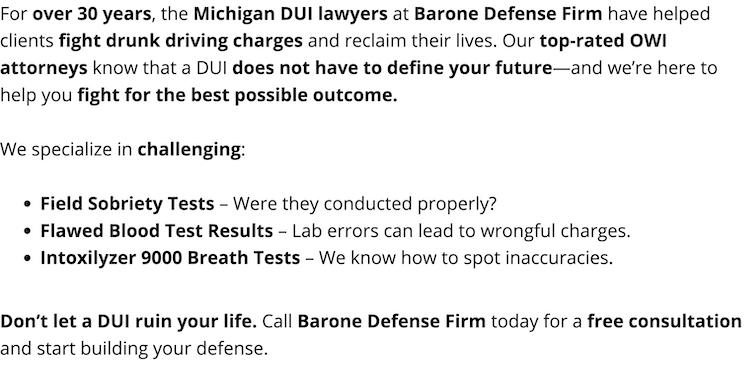Involuntary Manslaughter Sentence: OWI Michigan Manslaughter
In Michigan, a person may be charged with vehicular manslaughter if he or she is a motor vehicle driver and causes the death of another person when operating while intoxicated (OWI). Committing the unlawful act (DUI charges or driving drunk and causing the collision) is the underlying predicate offense for boosting this to a felony.
No "intent to kill" needs to be proven, since the inherently dangerous act of drunk driving or drugged driving is what fuels this felony statute. This distinction separates voluntary manslaughter and first degree or second-degree murder charges, which requires the intent to kill, or a heat of passion set of facts, or engaging in an inherently dangerous act without any adequate provocation to do so.
The State has to prove the OWI charge to satisfy a key element of the MI involuntary manslaughter laws. So, the involuntary manslaughter meaning is set forth under the penal code which outlines the criminal charges. The max sentence for involuntary manslaughter is potentially harsh.

A typical involuntary manslaughter sentence range. From our research of Michigan records, the average involuntary manslaughter sentence Michigan handed down is between 5 and 7 years per death in Michigan. As a felony offense, the punishment for Michigan OWI vehicular manslaughter can include long-term imprisonment in addition to other serious penalties.
In reading any criminal statute, the written language controls that law's applicability. Cornell University School of Law described "elements" (of a crime) as follow:
What is the involuntary manslaughter definition? In general, every crime involves three elements: first, the act or conduct (actus reus); second between the act and the effect (typically either proximate causation or a but-for causation element)., the individual's mental state at the time of the act (mens rea); and third, the causation
Involuntary Manslaughter Sentence and Possible Punishment in MI
The statutes set forth below allow for great variability in a Judge's meting out punishment on an involuntary manslaughter sentence. The definition of involuntary manslaughter is contained within the wording of the State statute.
When intoxicated driving is the underlying cause, involuntary manslaughter occurs when the impaired driver is at fault when colliding with other vehicles or pedestrians. The worst-case scenario places an involuntary manslaughter Michigan sentence at 15 years, plus potential fines.
Michigan law involuntary manslaughter. To look for the manslaughter "elements" under the Michigan involuntary manslaughter statute, MCL 750.321 contains the following language, setting forth the elements of such manslaughter charges:
- Manslaughter: Any person who shall commit the crime of manslaughter shall be guilty of a felony punishable by imprisonment in the state prison, not more than 15 years or by fine of not more than 7,500 dollars, or both, at the discretion of the court.
This range of penalties for this Michigan law allows for a criminal defense attorney to do extensive work before court to try to obtain a great outcome. Unlike other states that impose a mandatory minimum number of years to serve in prison, the wording for a Michigan involuntary manslaughter sentence does not contain such language.

A related statute, MCL 750-322, presents the following language to provide the same punishment for any "unborn quick child" that is killed by an intoxicated driver:
- Willful killing of unborn quick child: The willful killing of an unborn quick child by any injury to the mother of such child, which would be murder if it resulted in the death of such mother, shall be deemed manslaughter.
Michigan involuntary manslaughter sentencing guidelines. This statutory language for manslaughter convictions is less that a murder charge, but more than criminally negligent act in a motor vehicle for an ordinary traffic violation. The guidelines will always provide for a prison sentence, with additional “points” being given for level of intoxication.
How many years does involuntary manslaughter carry? An unintentional killing of another person by failure to yield (but not being too impaired to drive) is a misdemeanor and sentenced under a completely different statute. However, with a conviction for a Michigan OWI vehicular manslaughter, the same allegedly impaired operator could be sentenced to up to 15 years in prison as well as pay costly fines and have a lifetime driver's license revocation, in the Great Lakes State.
Is manslaughter a felony? Yes, under this statute, an involuntary manslaughter charge is. With so much at stake, having an experienced defense lawyer to defend you is critically important. If facing charged with this crime.
The maximum sentence for involuntary manslaughter in Michigan. The maximum sentence for involuntary manslaughter could be the 15 years plus the maximum monetary fine. Even if a person had a "no jail" sentence, she or he will encounter barriers with such a conviction on that person's record.

 Barone Defense Firm Home
Barone Defense Firm Home
















